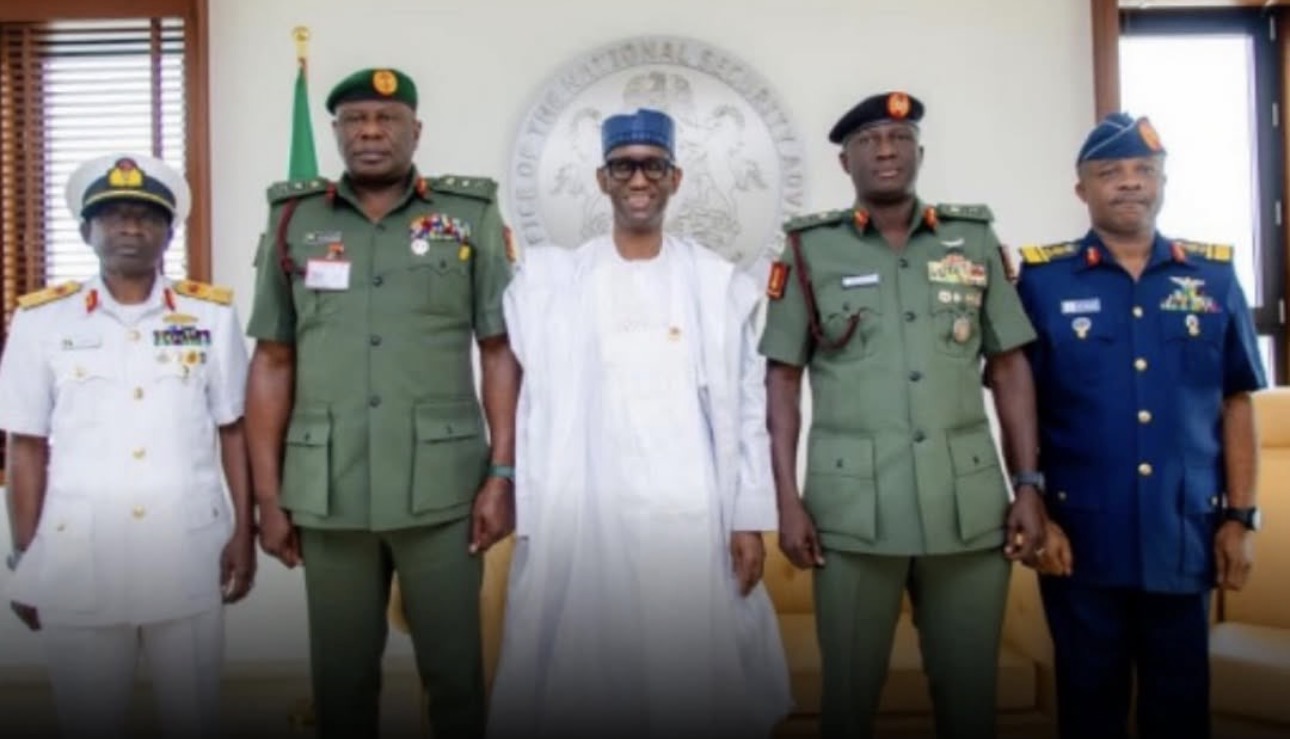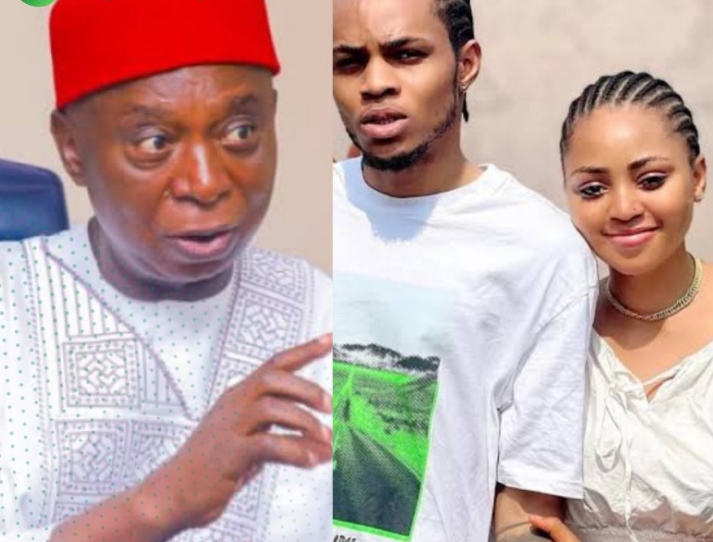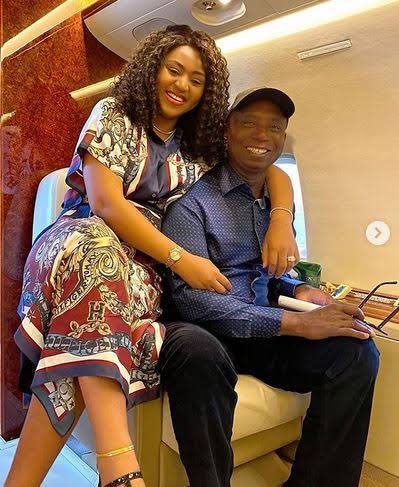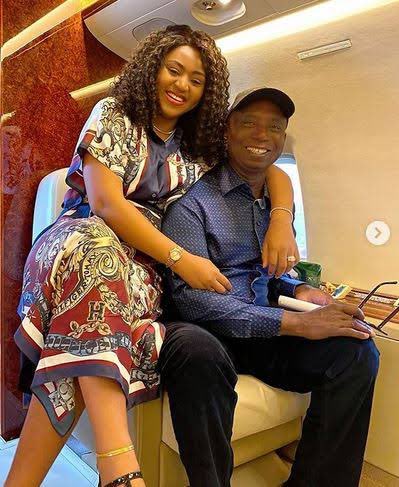
Tension in Abuja as NSA and Service Chiefs Hold Emergency Meeting Following Trump’s Military Intervention Warning

Nigeria’s security architecture was thrust into emergency mode on Monday as the National Security Adviser (NSA), Mallam Nuhu Ribadu, convened a high-level meeting with the nation’s service chiefs and heads of security agencies in Abuja. The sudden gathering came just hours after United States President Donald Trump issued a stern warning suggesting possible “military action” in Nigeria if the U.S. detects continued threats to democratic principles, human rights, and international security emanating from the country. The development has sent shockwaves through political and diplomatic circles, raising questions about U.S.-Nigeria relations, the credibility of the alleged threat, and the nation’s current security and political standing in the international community.
Sources close to the meeting confirmed that the NSA summoned the emergency session at the Office of the National Security Adviser (ONSA) in Abuja, with attendees including the Chief of Defence Staff, General Christopher Musa, the Chief of Army Staff, Lieutenant General Taoreed Lagbaja, the Chief of Naval Staff, Vice Admiral Emmanuel Ogalla, and the Chief of Air Staff, Air Marshal Hassan Abubakar. Also in attendance were the Inspector General of Police, Kayode Egbetokun, the Director General of the Department of State Services, Yusuf Magaji Bichi, and other top-ranking intelligence officials. The mood, according to insiders, was tense and urgent, as the country’s top security minds deliberated on the implications of Trump’s remarks and how Nigeria should respond diplomatically and strategically.
President Trump, in a televised interview late Sunday night, accused certain African governments, including Nigeria, of “compromising democratic values and threatening regional peace.” He further stated that the U.S. would “not hesitate to take decisive action where global security and human rights are under attack,” hinting at possible “direct intervention.” The statement, though vague, carried a tone that Nigerian authorities did not take lightly. It instantly triggered diplomatic unease, with the Ministry of Foreign Affairs reportedly seeking clarification from Washington through the Nigerian Embassy in the United States.
Within hours, Ribadu’s office issued invitations for an emergency security meeting, a move that underscores the gravity with which the Nigerian government is treating the matter. A senior official present at the meeting, who preferred anonymity, described the discussions as “intense and wide-ranging,” covering not only the potential diplomatic fallout but also how to safeguard Nigeria’s sovereignty and image internationally. “The meeting was not just about Trump’s warning, but about the broader implication of the message. Nigeria is a sovereign state, and any suggestion of military action by a foreign power cannot be ignored,” the source said.
While no official statement has yet been released at the end of the closed-door meeting, early reports suggest that the security chiefs resolved to increase intelligence coordination and enhance readiness levels across military formations nationwide. Some analysts believe the government is also weighing a formal response to the White House to clarify its position and prevent further escalation. There are speculations that Nigeria may also engage regional allies within ECOWAS and the African Union to present a united front against any external military threat.
Political observers, however, argue that Trump’s comments might have been exaggerated or taken out of context, noting that it would be highly unusual for the U.S. to directly threaten military intervention in a democratic African country. Still, the timing of the warning has sparked debates about Nigeria’s current political climate, especially in the wake of increasing insecurity, economic hardship, and alleged human rights abuses by state actors. Some commentators believe Trump’s statement could be a reaction to recent reports by international watchdogs criticizing Nigeria’s handling of internal conflicts, including security operations in the North and clampdowns on civil protests.
Reactions from Nigerians have been mixed. While some social media users called Trump’s statement “unacceptable interference” in the nation’s internal affairs, others viewed it as a wake-up call to Nigerian leaders. “Maybe it takes an outsider to remind our government that the world is watching,” one user wrote on X (formerly Twitter). Another added, “Trump can’t just threaten a sovereign nation, but if it makes our leaders sit up, so be it.” The digital space has since been abuzz with heated discussions, with hashtags like #TrumpWarning and #NigeriaSecurityMeeting trending across social media platforms.
Diplomatic sources in Washington hinted that the U.S. Department of State might soon release a clarification to calm rising tensions. However, analysts note that Trump’s personal communication style, often blunt and controversial, has a history of causing diplomatic friction, even with allied nations. “This is not the first time a Trump statement has caused global anxiety,” one U.S.-based African affairs analyst said. “But Nigeria’s reaction shows just how sensitive the country’s leadership is to external commentary, especially one that hints at force.”
Meanwhile, within Nigeria, opposition figures have seized on the situation to criticize the federal government’s handling of the nation’s image abroad. Some opposition lawmakers have called for the presidency to brief the National Assembly on the country’s diplomatic posture and any correspondence with the U.S. administration. One senator described the situation as “deeply concerning” and warned against allowing “foreign powers to use Nigeria’s internal weaknesses as justification for intervention.”
The Presidency, for its part, has maintained silence, with sources suggesting that President Bola Ahmed Tinubu has been briefed and is monitoring the situation closely. There are reports that he may soon convene a broader national security council meeting to align the country’s official stance and coordinate diplomatic communication with Washington. Ribadu, a former anti-corruption chief known for his strategic calm under pressure, is said to be leading efforts to ensure that Nigeria’s response remains firm but measured.
Internationally, several African governments are also watching developments in Abuja closely. With the continent already witnessing heightened Western scrutiny over governance and democratic stability, particularly after recent coups in Niger, Mali, and Burkina Faso, many see Trump’s warning as a potential precedent for future foreign interference. Diplomats warn that such rhetoric, if left unchecked, could strain U.S.-Africa relations at a time when global alliances are shifting rapidly toward new power blocs.
As night fell on Monday, the atmosphere in Nigeria’s capital remained charged, though calm. The streets of Abuja were bustling as usual, but among the corridors of power, a heavy sense of uncertainty lingered. Security patrols around key government facilities were subtly intensified, and some observers noticed increased movement of official convoys around the Defence Headquarters area. Although the government has yet to issue a formal statement, Nigerians are bracing for what could be a defining moment in the nation’s foreign policy and internal security direction.
For now, the question remains whether Trump’s comments were an empty threat, a warning shot, or a sign of something deeper brewing in the global geopolitical landscape. But one thing is clear: Nigeria’s leadership has taken notice, and the country’s security hierarchy is on high alert. The coming days will likely reveal whether this episode ends as a fleeting diplomatic scare or the beginning of a new chapter in U.S.-Nigeria relations — one where the world’s largest black nation finds itself once again at the center of international attention.


